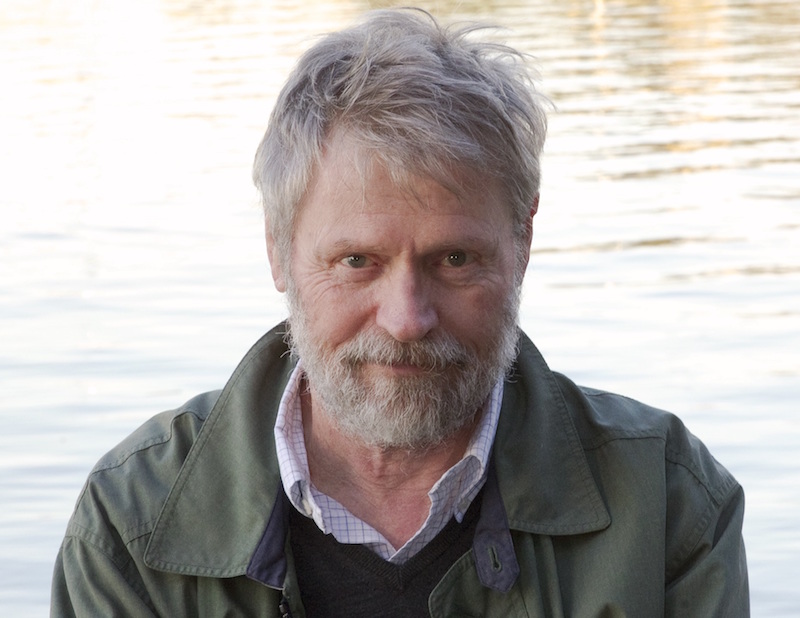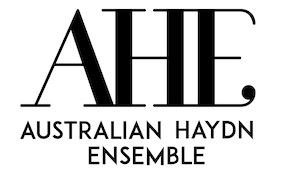City Recital Hall, Sydney
August 4, 2018
“I’m a person who puts dots on paper and I am slightly bedazzled by all this attention.” So said a typically modest Ross Edwards, Australian classical music’s most performed and arguably most popular contemporary composer, who turns 75 later this year.
For 40 of those years he has composed pieces for two of this country’s finest ensembles, Sydney Chamber Choir and Synergy, the percussion ensemble collective, but he is most famous for the worldwide TV broadcast of his Dawn Mantras with a young girl chorister perched atop the Sydney Opera House sails to sing in the new Millennium.
 Ross Edwards. Photograph © Bridget Elliot
Ross Edwards. Photograph © Bridget Elliot
The “attention” Edwards referred to was a birthday concert put on by these two groups to celebrate the man and his music. It was to have been conducted by SCC Music Director Richard Gill but he was too ill to attend, although his voice was in the room in a recorded tribute to the composer. Instead three directors – founder Nicholas Routley, Paul Stanhope and Sam Allchurch, who will take over the baton from Gill next year – led the packed City Recital Hall audience through a program of works by Edwards, as well as composers ancient and modern who inspired him and were influenced by him.
His music is always easy on the ear, permeated by the the flora and fauna of the Pacific Rim, full of catchy rhythms but with a deep sense of ritual and spirituality. He also has a keen sense of fun – witness the warm-up routine and eventual ecstatic aerobatic manoeuvres of the jousting marimbas in Prelude and Dragonfly Dance, or the tongue-twisting, scansion-defying listing of Latin and Greek floral names in the Ecstatico section of Flower Songs which closed this concert – only to be delightfully parodied a few moments later in a surprise rendition of “Happy Birthday”.
His trademark mantras and cyclical dance/chant manyinas were much in evidence throughout the evening in a program which spanned almost a millennium, from Hildegard von Bingen’s poetic plainsong O quam preciosa – beautifully rendered by six soprano and alto soloists – to choir member Josephine Gibson’s moving setting of First Dog On The Moon’s poem on asylum seekers, Let Them All Come.
In the first half we heard from Edwards’ influencers Peter Sculthorpe, a rare choral gem Autumn Song, and Claudio Monteverdi, whose ground-breaking madrigal Zefiro torn received a stunning performance under Allchurch and led seamlessly into three of Edwards’s 1980 Five Medieval Latin Songs.
And following the format of the ancient preceding the modern, Routley conducted the Kyrie from the 15th century Missa Mi-Mi by Johannes Ockeghem – he was notable for introducing bass singing into polyphony – and the splendid Christ the King, a 1984 work by Clare Maclean who has composed several commissions for the choir.
The second half was given over to contemporary music with Stanhope conducting his own Agnus Dei which is coupled with a setting of Mary Frye’s funereal poem Do not stand at my grave and weep. In a night of many highlights this one certainly shone bright.
He also led the choir for two world premieres of his students – Olivia Swift’s Dew, a setting of Sara Teasdale’s poem in which pastoral descriptions transform into a meeting of two lovers, and the Gibson work. Both composers received warm ovations.
The evening of spoken tributes and music ended as it should with two works by Edwards himself – the contemplative Agnus dei from Mass of the Dreaming, sung in Latin but with its roots deep in Mother Earth and Aboriginal Dreamtime, and the fiendishly challenging Flower Song.
Introducing the works, and at the same time dedicating the concert to Gill, Edwards asked Stanhope if Ecstatico had become easier to conduct over the years. Stanhope said “no” and Edwards urged the audience to enjoy it, adding “and it should be fun to watch, really”. And fun it was.












Comments
Log in to join the conversation.